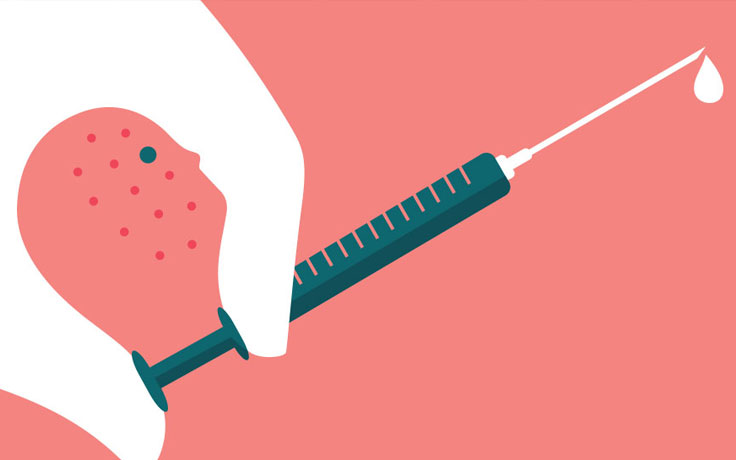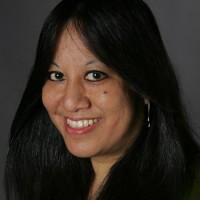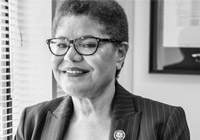STEP BY STEP, California state Sen. Richard Pan, a pediatrician, is trying to make it harder to avoid vaccinating children. It has won him accolades from fellow doctors — and made him a target of threats, confrontations and physical violence by some of those who disagree with his stance.
In August, an anti-vaccination activist, Austin Bennett, livestreamed a clash on a sidewalk near the Capitol in which he shoved Pan from behind, saying afterward in the video, “If he got what he deserved, he would be hanged for treason for assaulting children, for misrepresenting the truth.” But it was Bennett whom police cited, with misdemeanor battery, then released, Sgt. Vance Chandler said in an email.
In a statement to reporters, Pan said anti-vaxxers “have attempted to dehumanize me and other public health advocates on social media while making death threats. When rallying here at the Capitol, they displayed posters and wore shirts with my face splattered with blood.” Pan said the video “may even now be inciting a future assailant who seeks to up the ante with a weapon.”
Four years ago, Pan won passage of legislation outlawing personal-belief exemptions to vaccination requirements. Since then, he says, different exemptions — for medical reasons — have more than tripled. Earlier this year, Pan introduced a bill that would crack down on falsified exemptions. It was signed into law by Gov. Gavin Newsom in early September. “It is my hope,” Pan said, “that parents whose vulnerable children could die from vaccine-preventable diseases will be reassured that we are protecting communities that have been left vulnerable because a few unscrupulous doctors are undermining community immunity by selling inappropriate medical exemptions.”
A fellow pediatrician, Dr. James D. Cherry, a distinguished research professor at the David Geffen School of Medicine at UCLA and UCLA’s Mattel Children’s Hospital, has taken note of the profiteering. As early as 1990, in a paper for the Journal of the American Medical Association, Cherry wrote that there was no evidence that vaccinations against pertussis, or whooping cough, cause permanent neurological illness. “I pointed out,” Cherry said in an interview, “that there were people who were making money out of [opposing pertussis vaccinations] — people who sell vitamins and supplements were making money, saying, ‘If you take my supplement, you’ll be OK.’
“I think the really discouraging thing is the doctors who will cheat for money.”
—–
Over the years, Dr. Cherry has heard many voices challenge the use of vaccines to prevent childhood diseases. He is not surprised by a growing debate over immunization against measles. For Cherry, it comes down to a simple, scientifically proven fact: Vaccines save lives.
“If you get measles in the U.S.,” he said, “you have a 1 in 500 chance of dying. You have a 1 in 1,000 chance of getting encephalitis. You have, depending on the age you get it, a risk of getting SSPE, subacute sclerosing panencephalitis, a horrible neurologic disease, which is always fatal.”
Cherry has published hundreds of papers, given talks around the world and consulted with numerous health agencies on pertussis, measles and other diseases. “In this country,” he said, “measles has been eradicated because there’s no sustained transmission when it gets reintroduced.”
But that could change.
After the year 2000, when measles was declared eradicated in the United States, vaccination rates began to drop, but “herd immunity” kept the disease in check. Herd immunity means that if 95% of the population is vaccinated, pockets can be infected but the measles won’t spread to the broader population. However, Cherry said, “If [the vaccination rate] drops much below that, then it could reestablish circulation.”
According to the Centers for Disease Control and Prevention, 1,251 individual cases of measles have been confirmed in 31 states through October 3. That marks the largest outbreak of measles in two decades. Most of these cases, the CDC reported, were among people who were not vaccinated.
The measles vaccine was introduced in 1963, a year after President John F. Kennedy signed into law the Vaccination Assistance Act (Section 317 of the Public Health Service Act), which directed the CDC to create the first nationwide immunization programs to “achieve as quickly as possible the protection of the population, especially of all preschool children.”
Today, all 50 states and the District of Columbia require children entering kindergarten to be vaccinated against polio, diphtheria, tetanus, pertussis, measles and rubella. California also requires immunization against chickenpox, hepatitis B and mumps. Since 2015, following a measles outbreak that began at Disneyland and infected 136 people, California has allowed exemptions from these shots only if a doctor provides a medical reason for the exemption, tightening rules that once permitted exemptions for religious or philosophical beliefs.
Cherry recalls speaking to parents at a preschool in 2015. About 10% of its students were not up to date on their vaccines, he said. But not all of their parents were opposed to immunizations. “There were working parents who should have been getting vaccinations for their children, but they were busy. There was no measles around, so it wasn’t a big deal.”
Nonetheless, he said, with satisfaction, “Almost immediately after I gave that talk, they went and got the vaccinations.”
—–
Deliberate opposition to measles immunization traces back to misinformation in a discredited study published in 1998 in The Lancet, a medical journal, in which Andrew Wakefield, a British doctor, claimed to have found a link between measles vaccine and autism. Those findings were later determined to have been based on falsified and manipulated data, according to the U.K.’s General Medical Council, and subsequent research found no connection. The Lancet rescinded the paper in 2010.
Autism Speaks, a nonprofit organization dedicated to supporting autistic children and their families, says without hesitation: “Scientists have conducted extensive research over the last two decades to determine whether there is any link between childhood vaccinations and autism. The result of this research is clear: Vaccines do not cause autism.”
Still, a relatively small but vocal group continues to raise concerns that immunizations are related to neurological problems in children. None of the claims have been proven scientifically. The opponents of vaccinations include Robert F. Kennedy Jr., a son of Sen. Robert Kennedy and a nephew of John F. Kennedy. A longtime environmental activist, Robert F. Kennedy Jr. founded Children’s Health Defense, known for its anti-vaccine activism. He and his organization have promoted claims of vaccination health hazards that have been repeatedly debunked by science.
Immunization opponents also include actress Jenny McCarthy, whose son was diagnosed with autism in 2005. She claimed there was a connection between his autism and vaccines. Her book, Louder Than Words: A Mother’s Journey in Healing Autism, spent four weeks on The New York Times bestseller list in 2007. She also wrote the foreword to Wakefield’s 2011 book, Callous Disregard: Autism and Vaccines — the Truth Behind a Tragedy.
Although Wakefield’s claims have been disproved, they are resurfacing on the Internet. “People believe what they want to believe, in spite of what the truth is, what the scientific evidence is,” Dr. Cherry said. “Particularly now with social media. It’s made things much worse.”
Growth in social media comes at a time when there has been a decline in funding and support for trusted experts, says Sarah Roberts, an assistant professor of information studies at UCLA.
There also has been a decline in support for information intermediaries, Roberts said in an interview, “people like librarians and others who separate the wheat from the chaff when it comes to what is a trustworthy and viable information source and what is a dubious and questionable source.”
Information seekers, she said, need to evaluate whether they are seeking information to draw a conclusion — or whether they are drawing a conclusion and seeking information to support it.
“If we’ve already decided that vaccines are bad,” Roberts said, “what is the likelihood that we’re going to seek out information to the contrary? What we are probably going to do is seek out like-minded people to bolster our belief.”
Scientists are not always the best disseminators of scientific information, Roberts said, because they are not trained to do it. “It’s very important that academics become better stewards of the information that they have, and that they actively engage with the public, whether it’s doing interviews or writing op-eds or providing a well-researched but accessible article in mainstream publications.”
This is especially crucial now, she said, when there is a maligning of experts — “a phenomenon we see at the highest echelons of power in the United States” — and “bad information is put up against good information as if it is equivalent. It’s simply not.”
Dr. Cherry finds the situation frightening.
“There are ideologies that are bigger than truth,” he said. “It’s scary because people believe a sound bite rather than all this.” He pointed to stacks of research papers on his desk and volumes of medical journals on his shelves.
But becoming frustrated or angry, he said, is not helpful.
“I think you just have to keep putting out new data. The right information will always be there.”
























